A better school calendar
Year round school offers more benefits than the tradition schedule
Balanced school calendars, also referred to as year round school, have been proven to benefit both students and teachers. The infographic above showcases three main effects year round schooling has on students.
December 6, 2019
Balanced school calendar or year-round school leaves a bad taste in the mouths of many students and the idea of it is very unappealing. This is most likely due to the misleading name and the very little information students actually know on the topic.
Unlike what the name suggests, year-round school offers more breaks throughout the year. This is meant to divide the three summer months into two-week breaks between each semester and one month of summer vacation.
According to reporter Lisa Stark from PBS, “long summer breaks can be a time for learning loss, known as the summer slide. Low-income students are at an even greater risk because they may not have the money for camps, classes or summer activities to keep their minds active,” Stark wrote. “Low-income students also lose about two months of reading skills. Most students, regardless of income, lose some math skills.”
After a long summer break, students must re-acclimate to the school schedule, their teachers and peers, as well as school rules and expectations, homework and other non-academic schedules like sports or clubs. This can start the school year off slow, allowing valuable learning time to be wasted.
According to Associated Content, shorter breaks compared to one long summer break also provide both students and teachers with time to relax and regroup. Vacation time can also be more evenly distributed throughout the year. This makes it easier to schedule family vacations and for students to revitalize themselves more frequently.
The year-round schedules also present opportunities for students to attend academic camps and club programs that may not be available during the summer months.
Families who struggle to find childcare or pay childcare expenses will benefit as will children who are in sub-par childcare during the summer months or after school care. Year-round school could also be a safer option for children who may be unsafe in their home environment.
Parents may worry that the lack of summer could leave students who need summer school stranded. This, however, would be taken care of because teachers can offer “mini-summer school” lessons, where struggling students can come to school to get help during their time off.
For students with special needs, or for students struggling in a particular subject, quick interventions could help keep all students on pace. This could raise test scores if students have a better understanding of the subject and can get the help they need easier.
According to Amanda Morin, a reporter from Very Well Family, extending the school year may help make teaching a full-time, more appealing profession for educators. Year-round schools have a lower staff turnover rate which could be due to the year-round calendar giving teachers the workdays they need at the times they most need them. These days would include the end of a grading period when demands for their time are especially high.
A balanced school calendar hold many benefits, it is hard to find reasons to not seriously consider implementing it. Although the name creates a less than appealing image in many students minds, it can be easy to infer that students would conform to the schedule.







